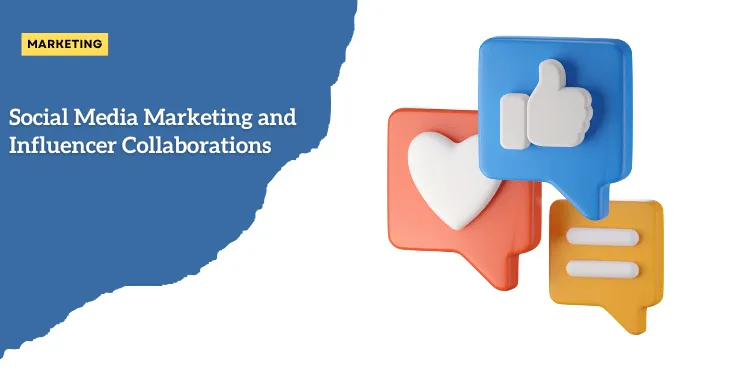Social Media Marketing and Influencer Collaborations

Anúncios
Key Focus: Leveraging Social Media to Expand Reach and Drive Engagement
In today’s digital era, the UK e-commerce sector is experiencing a significant shift. Social media platforms such as Instagram, Facebook, and TikTok are now at the forefront of reaching new audiences, enhancing brand visibility, and fostering customer relationships.
By strategically using these platforms, brands can interact with a wider and more targeted customer base, tapping into previously unexplored markets.
Anúncios
As businesses increasingly rely on these digital spaces to enhance their marketing efforts, social media has become an indispensable tool for driving brand awareness and customer engagement.
For e-commerce businesses in the UK, social media marketing offers unparalleled opportunities to target specific demographics, generate buzz around products, and establish a strong online presence.
With millions of active users across various platforms, brands are able to deliver tailored marketing messages that resonate with users, ultimately leading to higher conversion rates and increased sales.
Anúncios

Example: Gymshark’s Success with Influencer Marketing
A prime example of successful social media marketing in the UK is Gymshark, a well-known fitness apparel brand.
Gymshark has expertly utilized influencer partnerships across Instagram and TikTok to create buzz around their products, driving both awareness and sales.
By collaborating with fitness enthusiasts and influencers, Gymshark has built a strong, community-driven approach that resonates with their target audience.
Through these partnerships, Gymshark has been able to leverage the authenticity and trust that influencers hold within their communities.
By associating with fitness influencers who share the brand’s ethos and values, Gymshark has not only promoted its products but also created a sense of community and belonging.
These influencer collaborations have allowed Gymshark to tap into niche markets, reaching fitness enthusiasts and individuals who might not have been exposed to the brand through traditional advertising channels.
Moreover, Gymshark’s strategic use of social media influencers has helped them amplify their messaging, reach younger demographics, and foster deeper emotional connections with potential customers.
By working with influencers who have established credibility in the fitness space, Gymshark has been able to market its products in a way that feels organic and relatable, which has contributed to the brand’s meteoric rise in the competitive fitness apparel market.
Why It Works: Building Trust and Authenticity Through Influencer Collaborations
Influencer marketing works because it effectively blends the power of social proof with targeted engagement.
Consumers are more likely to trust recommendations from influencers they follow compared to traditional advertisements.
This is especially true in the e-commerce space, where purchasing decisions are often influenced by factors like trust, relatability, and recommendations from peers or personalities.
One of the primary reasons influencer collaborations have become so effective in social media marketing is the authenticity they bring.
Influencers, especially those who are passionate about the products they endorse, have an innate ability to create authentic and engaging content that speaks directly to their followers.
This sense of authenticity fosters trust, which is crucial for e-commerce brands looking to build long-term relationships with their customers.
By collaborating with influencers, brands tap into the personal connection that these figures have cultivated with their followers.
When an influencer shares their experience with a product or service, it feels more like a personal recommendation rather than a traditional ad, making consumers more likely to act on the suggestion.
This leads to a higher level of engagement and ultimately, more conversions.
In addition to trust and credibility, influencer marketing also helps brands reach niche audiences.
Social media influencers often cater to specific interests or communities, allowing e-commerce brands to target particular segments of the market.
Whether it’s fitness enthusiasts, beauty aficionados, or tech geeks, influencer partnerships enable brands to tailor their messaging and reach audiences that are most likely to be interested in their products.
How Social Media Marketing Supports E-commerce Growth
E-commerce businesses in the UK can greatly benefit from an integrated social media marketing strategy that leverages influencer collaborations.
These platforms offer a direct line to potential customers, allowing brands to create personalized content that resonates with their target audience.
Here’s how social media marketing plays a critical role in driving e-commerce growth:
1. Enhanced Brand Visibility
Social media platforms have billions of active users, which means e-commerce businesses have an enormous audience to tap into.
By sharing valuable, engaging content on platforms like Instagram, Facebook, and TikTok, brands can significantly increase their visibility.
Influencer collaborations further amplify this effect by reaching followers who may not have otherwise discovered the brand.
The viral nature of social media means that content shared by influencers has the potential to reach a vast number of people quickly, resulting in rapid brand exposure.
Influencers with large followings can help elevate a brand’s presence in a highly competitive marketplace, making it easier to stand out and capture the attention of potential customers.
2. Targeted Advertising
Social media platforms offer sophisticated targeting tools that allow brands to reach specific demographics based on factors like age, location, interests, and online behaviors.
These tools ensure that e-commerce brands are connecting with the right audience, leading to more relevant engagement and higher conversion rates.
In addition to organic influencer posts, brands can also invest in paid social media advertising.
These ads can be strategically targeted to reach people who have already shown interest in similar products or services, further boosting the likelihood of a purchase.
This combination of organic influencer marketing and paid ads creates a highly effective strategy for increasing sales and driving long-term growth.
3. Building Customer Relationships
Social media marketing is not just about driving sales—it’s also about building lasting relationships with customers.
Platforms like Instagram and Facebook allow brands to interact with their followers in real-time, responding to comments, engaging in conversations, and offering personalized customer support.
This interaction creates a sense of community and encourages brand loyalty.
Influencer collaborations enhance this by providing an additional layer of authenticity.
When influencers share their experiences with a product, it humanizes the brand and makes it more relatable to potential customers.
This helps foster a deeper emotional connection between the brand and its audience, which can result in repeat business and word-of-mouth recommendations.
4. Increasing Conversions
Perhaps one of the most compelling reasons for utilizing social media marketing and influencer collaborations is their ability to increase conversions.
As mentioned earlier, influencer endorsements act as trusted recommendations that lead to higher conversion rates.
Whether it’s a discount code, an exclusive offer, or a product demonstration, influencer collaborations can drive direct sales in a way that feels organic and non-intrusive.
Influencers are able to showcase products in a context that is familiar to their audience, making it easier for consumers to imagine how the product would fit into their own lives.
By providing real-world use cases and authentic experiences, influencers can effectively push potential customers further down the sales funnel, leading to more purchases.
Best Practices for Successful Social Media Influencer Collaborations
To maximize the impact of influencer marketing, e-commerce brands should keep a few best practices in mind when working with influencers:
-
👥 Choose the Right Influencers: It’s essential to partner with influencers who align with the brand’s values and target audience. The most successful collaborations are those that feel authentic and natural, which is why selecting the right influencer is crucial.
-
🎯 Set Clear Goals and Expectations: Brands should outline clear goals for their influencer partnerships, whether it’s driving traffic to a website, increasing brand awareness, or boosting sales. These goals should be communicated clearly to influencers to ensure alignment and measure success.
-
🎨 Offer Creative Freedom: Influencers are successful because they have built trust with their audiences. Giving them creative freedom to present products in a way that resonates with their followers will ensure that the collaboration feels authentic and engaging.
-
📊 Track Performance: It’s important to monitor the performance of influencer campaigns to understand what’s working and what’s not. Brands should track key metrics such as engagement, reach, and conversions to evaluate the effectiveness of their partnerships and make data-driven decisions for future campaigns.
Conclusion: Influencer Marketing’s Role in E-commerce Success
| Scenario | Before | After (Influencer Marketing) |
|---|---|---|
| 📱 Social Media Platforms | Traditional advertising on TV, print, and billboards | Leveraging Instagram, Facebook, and TikTok to reach targeted audiences |
| 👩💻 Influencer Partnerships | No collaboration with influencers | Strategic collaborations with influencers to create authentic brand experiences |
| 📈 Brand Engagement | Limited interaction with customers | Real-time engagement with customers via influencer-led campaigns and posts |
| 🛍️ Product Promotion | Generic ads with broad targeting | Customized product recommendations based on influencer endorsements |
| 👥 Audience Reach | Broad, untargeted audience | Niche targeting through influencer communities and followers |
In conclusion, social media marketing and influencer collaborations are key drivers of success in the competitive UK e-commerce sector.
Through targeted campaigns, authentic partnerships, and engaging content, brands can reach new audiences, build trust, and ultimately increase conversions.
As more businesses look to leverage social media to drive growth, influencer marketing will continue to play a central role in shaping the future of e-commerce.
By following best practices and partnering with the right influencers, brands can harness the power of social media to create lasting relationships with their customers and achieve sustained success in the digital age.






